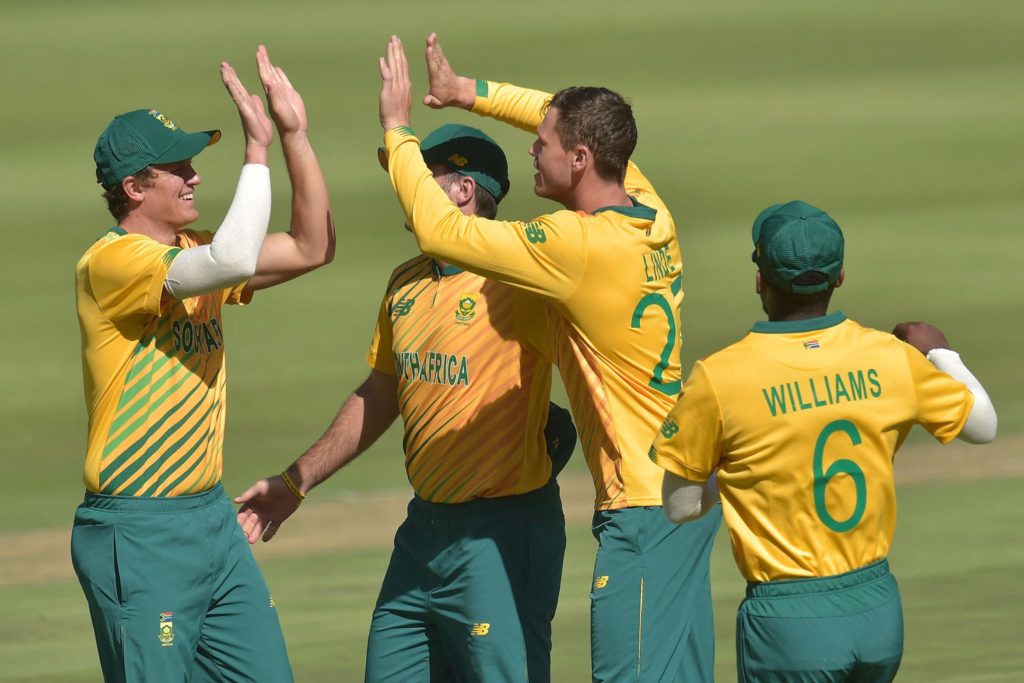There is no cricket reason for George Linde’s omission. His treatment is an indictment of the selectors’ competency, writes RYAN VREDE.
My heart broke for Linde as he stood during the national anthem, prior to the first T20I against Sri Lanka on Friday. I saw some on Twitter describe his expression as stoic. It was anything but.
Stoic by definition reflects: An austerely calm, philosophical way that shows fortitude, mastery of the emotions, and uncomplaining acceptance of destiny. Linde, though, was mastered by his emotions, a state that was rooted in a failure to comprehend his destiny. He looked a broken man.
His destiny is watching the upcoming T20 World Cup from the stands, after only being selected as a travelling reserve. This following a year-long investment in him as one of the Proteas’ key bowlers.
Since debuting in November 2020, the left-arm spinner has rarely missed a T20I match. He looked certain to travel to the UAE as, at very least, part of the squad, and a near-certain starter based on the aforementioned investment.
Statistically, he has been excellent. Indeed, since the 2019 World Cup, no Proteas bowler has had a better strike rate (15.43), dot-ball percentage (58.33), boundary concession percentage (16.72), or a better economy rate (5.89) during the PowerPlay (stats via @Shaun_Analytics).
The Proteas have been mediocre in T20I cricket under coach Mark Boucher, winning just 11 of 25 matches, three of those against Ireland. Linde, however, has rarely not been among the pick of the bowlers. His omission makes no cricket sense.
It is not that I’m opposed to his replacement, Keshav Maharaj. Indeed, in July I called for his inclusion, writing: “This is not an argument against either George Linde or Bjorn Fortuin, both of whom are highly competent with the ball and offer more than Maharaj with the bat. It is an argument for the bold step of playing three spinners and dropping a fast bowler [from the starting XI).”
Tabraiz Shami picks himself in that trio, but I wanted to see a scenario where Linde, Maharaj and Fortuin competed for the remaining spin berths, given conditions that will favour spin. That appears to be the way the Proteas are going tactically, only they’ll be missing their PowerPlay kingpin after building him to just that across 14 T20 matches.
They also lose a batsman in that approach. Linde has undeniably betrayed his talent on the batting front. He averages 11.10, when he is a 25 talent. Yet, in a Proteas team that has struggled to impose themselves consistently with the bat, losing a gifted lower-order player of Linde’s ilk is tactically perplexing.
Aside from the lack of cricketing reasons for Linde’s omission, I hated the perception it created – that a really gifted white player is being excluded in favour of a black one.
I don’t know whether Maharaj’s inclusion at Linde’s expense is owed to a transformation numbers game. It would be a shame, because Maharaj is a world-class cricketer, and Linde is too good to ignore. Neither deserves the pain associated with the perception.
Yet, it’s hard to counter those who attribute Linde’s omission to his race. The national selectors have exposed their players to this deeply hurtful experience. If Linde were a black player, his story would be one that carries massive weight at Cricket South Africa’s Social Justice and Nation Building hearings.
We can’t heal a cricketing nation by hurting anyone, least of all those whose talent demands recognition.
The selectors, through Linde’s omission, have therefore failed on a cricket and race relations front. They should not be allowed to disown the responsibility for this.
Proteas squad: Temba Bavuma (captain, Lions), Keshav Maharaj (Dolphins), Quinton de Kock (wicketkeeper, Titans), Bjorn Fortuin (Lions), Reeza Hendricks (Lions), Heinrich Klaasen (Titans), Aiden Markram (Titans), David Miller (Dolphins), Wiaan Mulder (Lions), Lungi Ngidi (Titans), Anrich Nortje (Warriors), Dwaine Pretorius (North West Dragons), Kagiso Rabada (Lions), Tabraiz Shamsi (Titans), Rassie van der Dussen (Lions).







